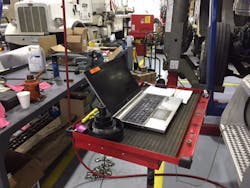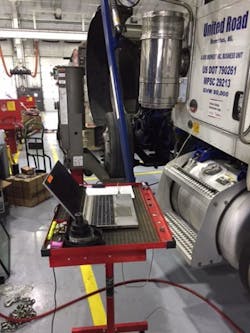In ways large and small, data is quickly becoming the lifeblood of the trucking industry – whether we like that trend or not.
And, like it or not, more and more information is coming at motor carriers than ever before – a veritable “tsunami of data,” according to described by Bill Combs, director-connected fleet for Penske Truck Leasing – all part of a “data revolution” that is rapidly upending traditional practices in the freight market, if not the broader business world as well.
“In 2010 – that’s just seven years ago right? – Eric Schmidt [former CEO of Google and now executive chairman of Alphabet, Inc.] was talking about how 5 ‘exabytes’ of information was created between the dawn of civilization and 2003,” noted Steve Sashihara, founder and CEO of Princeton Consultants, in a recent conference call hosted by Stifel Capital Markets.
“[In 2010], Schmidt said that much information is now being created every two days – and that was seven years ago,” Sashihara stressed.
“Now we no longer talk about ‘exabytes’ when we’re trying to impress people with giant amounts of data; we talk about ‘zettabytes,’ which is a thousand exabytes,” he pointed out. “And they’ve also come up with the next two 1,000 multipliers; they’re called 'yottabytes' and 'zettabytes' or at least that’s what Wikipedia told me. There’s a lot of data and it’s getting bigger and faster.”
And while Sashihara acknowledged that the “Internet of Things” or “IoT” and “Big Data” are both “very trendy” terms at the moment, he also believes that underneath this “trendy labeling” is a real bona fide revolution in manufacturing, distribution and therefore transportation. There is just no escaping it in part because a HUGE amount of money is involved.
“Better information means [putting] the right resources in the right place at the right time and that’s basically the heart of what the buyers are buying and the sellers are selling,” Sashihara said, pointing out that one reason why “a lot of people in the finance community are suddenly looking at our little industry” is that there’s a $1.45 trillion of direct spending in the U.S. on logistics and transportation.“That’s 8.5% of our GDP or 29% of the world’s GDP so it’s a big number,” he emphasized. “But more importantly perhaps, that’s the direct spending on our industry; there’s $139 trillion worth of goods that are inside our trucks, trains, planes, ships. The direct spend is pretty remarkable but it’s also what’s in our vehicles and to the extent that could be more efficient, there’s a lot of room for good investments there potentially.”
Yet here’s the worry point: Can all this data trucking expects to rely upon to improve efficiency and profits be truly trusted? In other words, is it error-free, accurate, and above all useful?
Maybe not, according to what Experian Data Quality (EDQ) discerned in its recent Global Data Management Benchmark Report.
Produced by Loudhouse for EDQ in November last year, this annual the study polled more than 1,400 people across eight countries around the globe in various corporate positions, including information technology (IT), data management, marketing, customer service, sales, operations, and more.
Experian’s report found that while 84% of U.S. organizations say they believe data is an integral part of forming a business strategy, they “lack confidence” in their data. On average, businesses believe 27% of their data is inaccurate, while the “C-suite” estimates error levels to be even higher, noted Thomas Schutz, EDQ’s senior vice president and general manager.
“Our study revealed that 52% of organizations rely on educated guesses or gut feelings to make decisions based on their data,” he explained in the report.
“The only data worth having is trusted data and while most organizations around the globe say that data supports their business objectives, less than half of organizations globally (44%) trust their data to make important business decisions,” Schutz said. “This is problematic because diminished confidence in the integrity of the data means that the strategic decision-making process becomes much more nebulous, potentially leading to high-risk situations.”He added that businesses today “simply cannot afford to base their decisions off of assumptions. If organizations lack confidence in the quality of their data, then it’s critical to get to the root of the issue.”
Schutz also noted that EDQ’s study found that human error was the most common cause of inaccurate data at organizations – a finding that is consistent with the firm’s 2016 study.
“The difference, however, is that the prevalence of human error decreased by nearly 23% since then,” he said. “This tells us that organizations are getting better at training their workforce to uphold data standards, or that they have implemented adequate technology to prevent human error.”
A few other findings from EDQ’s report regarding data integrity worth noting:
- Nearly one in two organizations globally (52%) said that a lack of confidence in data contributes to an increased threat of non-compliance and regulatory penalties, and consequently, a downturn in customer loyalty (51%).
- Just 18% of U.S. organizations have an advanced level of data quality, what EDQ’s called ‘optimized.’ Another 26% of U.S. businesses say that their organization is at the second highest level of sophistication, or ‘proactive’—up 2% from 2016.
- Just one in four organizations globally said that their data quality strategy is reviewed and maintained centrally by a single director; a decline of 11% since 2015.
- Worse yet, 15% of organizations globally said that all departments adopt their own strategy for data quality.
- 62% of organizations say the IT department has the greatest influence on how data is handled.
- Yet EDQ found that only one in four companies received their data in just a few hours following requests to their IT departments, with more than 70% of businesses have to wait a day or longer to receive their requested data. “In today’s fast-paced environment, can you afford to wait around?” Schutz said.
- 73% of C-level executives indicate that inaccurate data is undermining their ability to provide an excellent customer experience.
“Organizations need to be able to effectively leverage their information to make decisions and drive new initiatives,” Schutz stressed in EDQ’s report. “Data sources exist in silos, however, making it difficult to get a complete picture of an organization’s data assets, and a lack of governance means data must be cleansed and standardized before it can be used. For these reasons, among others, business leaders today find it hard to trust their organizations’ data assets.”
Without a foundational level of confidence in their data, organizations adopt manual processes and workarounds to augment their information; introducing room for error, Schutz warned.
“To become truly data-driven, organizations need information they can trust,” he emphasized.
Something to keep in mind as trucking continues to transition into a more digital enterprise.


